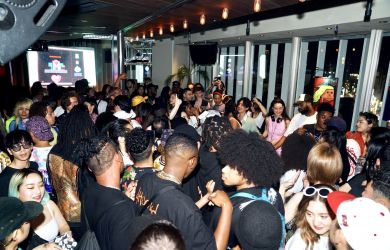
Originally published on metropolis.co.jp on March 2012

Yoyogi park sees its fair share of street entertainers. But comedy duo Gabez’s ludicrous sendup of samurai swordsmen seems to catch more attention than most. No matter how many times they slice and dice each other they just refuse to die, making a mockery of mortality.
“It’s easy to make people laugh because everybody has played at sword fighting as kids,” says Hitoshi (right) in an interview with partner Masa at park headquarters, after engaging an international crowd on a blustery winter’s day. While the Japanese love for swords is no news, the skit strikes a chord with foreigners, too. “They think, ‘Of course, Japanese samurai.’ We choose topics people can relate to easily.”
Influenced by Charlie Chaplin’s silent comedy, and Japanese humorists The Drifters, Gabez blends mime and physical gags with alarmingly dexterous dance moves honed by many years of practice.
An increasingly high profile hasn’t helped their opinion of themselves. “We did street performances for a few years, TV auditions, everything… but no one responded,” explains Masa ruefully. “We felt worthless. So we decided to call ourselves ‘garbage.’ But we changed the spelling to make it cooler.”
With his movie star looks, Masa plays the straightman to Hitoshi’s irrepressible buffoon. “For him everything’s a joke,” Masa says about Hitoshi, whom he met years back in a theater troupe. “At first it pissed me off, but now I’m amazed at his ability to keep it up.”
Gabez were recently taken under the wing by Gamarjobat, the silent comedy duo that has been Japan’s most successful comedic export. At the end of the month, the two pairs will join others as the Gamarjobat Project.
“We don’t know exactly what’s going to happen,” admits Hiroshi. “Basically it will be the four of us plus a few more. We haven’t begun rehearsing yet, although apparently Gamarjobat already has a plan.”
Comedy is hard to translate—despite centuries of tradition, Japanese comics aren’t known abroad. Gabez uses body language to sidestep linguistic barriers.
“We Japanese respond to comedy because we’re so serious in daily life,” Hiroshi says, pointing to forms from 600-year-old kyogen to contemporary owarai. “But Gabez jokes around all the time.”
“It’s our sheer idiocy that makes people laugh,” says Masa, drawing the inescapable conclusion. “From kids to the elderly—anyone can understand it.”
Kinokuniya Hall, Mar 27-28. See stage listings for details. www.gabez.jp

-390x250.jpg)



